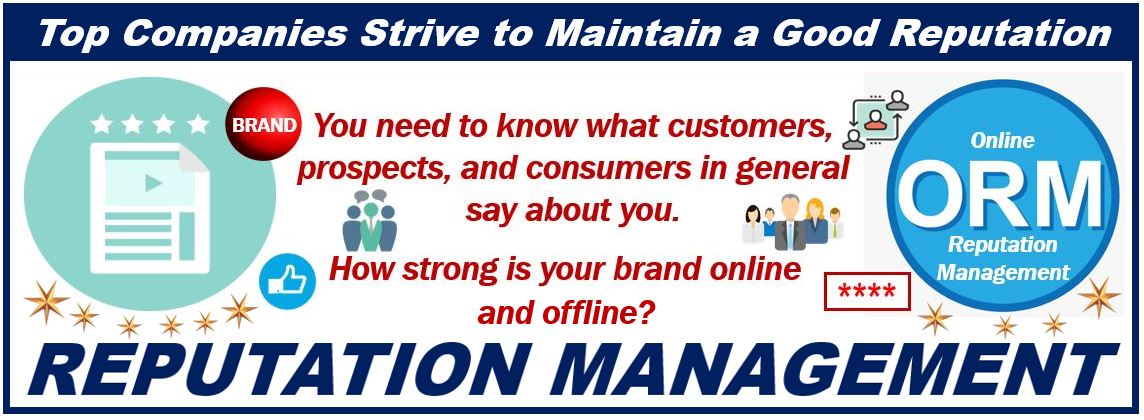Reputation management has become an important part of strategic planning in business. Markets have become saturated with quality but identical products, and non-obvious advantages of companies have come to the fore: brand image, reputation management, and effective system of communication with the audience. A company’s positive online reputation has become the key to business success as it increases recognition and customer loyalty, drives sales, and attracts new clients.

The sphere is fairly young, but it already has its own distinguished leaders. For example, Reputation House – is an agency that deals with a full range of online reputation work. The company co-founder is Nikita Prokhorov, one of the trendsetters in the ORM field. He explains:
“There are a lot of studies, and that says that 90% of the audience trusts the recommendations of people they know. The second figure that’s important to know is that around 70% of users trust customer reviews online.”
What is Online Reputation Management
Online Reputation Management (ORM) is a set of measures applied to form and improve a company’s or a person’s image in the web environment. There is no universal recipe for ORM. Each company forms a strategy based on its own experience and level of expertise; however, the purpose is always the same: to strive to have the brand talked about positively and recommended to other users.
Which tools are used in ORM?
- Review websites
- Blogs
- Interviews, comments of the company’s head and specialists
- Social networks
- Reviews on marketplaces
Generally, ORM implies the use of all the mentioned resources in different combinations, which vary from client to client. For instance, an ORM strategy for a public person mainly focuses on reputation in the media or social networks. A strategy for a company, on the contrary, often includes working with review websites or marketplaces.
What makes up ORM
Online Reputation Management is always a set of activities. It is generally considered that ORM involves four main areas of work:
- Monitoring – searching for and analysing information about a business, a person, or any other object of interest on the Internet.
- Responding – a range of communication processes carried out to mitigate the negativity, maintain a positive image, or demonstrate neutrally that a brand hears and takes into account its customers’ opinions.
- Positive information placement.
- SERM (Search Engine Reputation Management) – a set of works in search engines aimed at improving online reputation.
Reputation work is often supplemented by guerrilla marketing, branding, YouTube promotion, and the removal of defamatory information by legal means. Generally, these options are not required for every client and serve as an auxiliary tool in the overall strategy.
“The work of building an online reputation consists of four key modules. The very first is monitoring. Reports show whether there are more positive, negative, or neutral mentions of a person or a brand. The second block is dealing with negativity. The third block is creating a positive background, the so-called “seeding”: PR in the media, SMM, and feedback platforms. And, finally, SERM – Search Engine Reputation Management.”
– Nikita Prokhorov, Reputation House CEO
Reputation analysis
How to conduct a reputation analysis
Improving your online reputation is impossible without an audit. The analyst’s job is to collect and examine information about a brand, a person, or a product on websites, social networks, review platforms, blogs, and forums. The larger the object of analysis is, the broader the field of research and the scope of tasks become. When working with online reputation, we analyse the users’ attitude towards a brand or a company, monitor competitors and the overall situation in the industry, and prepare a strategy.
Analysis tools
It is impossible to reach complete and qualitative coverage of all mentions manually. Both retrospective and ongoing monitoring are carried out using automated systems that keep track of brand mentions in social networks and mass media.
Automated systems analyse the Internet as a whole and can collect all mentions of a particular object. However, you will have to assess the information manually, which is often quite challenging. How do you deal with a positive article that has a negative comment? What do you do with sarcastic pictures? It is important to establish the criteria for evaluating publications at the outset.
Essentially, an audit consists of the following steps:
- To determine the top of your search engine results and review each site manually.
- To analyse publications in the information field: on review websites, forums, or in the media.
- To evaluate information on marketplaces and geo-services.
- To identify the tone of comments on the App Store and Google Play (if you have an app).
- To identify critical points of work.
The recommended timeframe for a full online reputation audit takes at least three months. An analysis of mentions will help to evaluate the sources, identify frequent authors, and recognise fake news. This determines the further scope of work and assesses the amount of positivity or negativity about you on the web. A small company has a better position in this case since the number of publications will be much lower than that of a large corporation or a celebrity.
Benefits of ORM

Grows brand credibility
Most clients, businesses, and banks tend to look up your company online before placing an order or deciding to do business with you. That is why keeping your company’s online reputation in check is vital. Implementing a good ORM strategy means that a business can decide what information its clients and partners get to see on the Internet, rather than leaving it up to chance.
Effective ORM = effective advertising
Having a well-established ORM allows your business to enjoy advertising opportunities that can’t be accessed by paid search tools. One such perk is having a top position in the organic search results. Now, imagine that the top of the search results is filled with your company’s website, social media pages, and a few positive articles about your brand. It’s tempting, isn’t it?
In addition, a strong online presence will allow your brand to benefit from word-of-mouth advertising. Having a lot of different online sources with positive information implies that other people and companies are likely to share good reviews about you in various ways.
ORM helps to increase sales
Research shows that in most cases customers prefer to check online reviews before making a purchase. It goes without saying that companies with a negative reputation (the ones that have bad reviews, ratings, and negative comments about themselves) will tend to lose profit. Brands with a good reputation will inevitably attract more clients.
ORM helps to improve your business
Good ORM is not only about manipulating information, but also about using it to your business advantage. Actually, knowing what your clients think about your products can bring very fruitful results. Customers’ reviews are extremely important when it comes to launching a new product or working on improving an already existing one. It’s not only about the product, though. Use the reviews to see how satisfied the customers are, how well your points of sales (POS) are performing, and which markets should you consider entering.
ORM increases your reputational defences
A brand’s reputation can be easily ruined without a reliable ORM strategy. A reputational attack by competitors or an unforeseen turn of events may affect your business in no time. ORM allows you to be prepared in case things go south. Having a defence strategy in advance and constant monitoring along with an already well-established reputational standing will allow your brand to be prepared for any reputational challenge.
“The response speed to negative social media posts must be high, otherwise there will be no time to put them out.”
— Nikita Prokhorov, Reputation house CEO
FAQ:
What are the benefits of a good reputation?
First of all, having a good reputation literally brings you cash. Today, it’s just not enough for a business to do a good job, reputation is what counts when comparing you to your competitors. Moreover, having a good reputation will make it easier for you to fend off negativity.
ORM is very similar to SERM, could you explain the differences between these two concepts?
Many people confuse the concepts of SERM and ORM, and this is often because of the interpretations of pseudo-advanced Internet users. Let’s dot the i’s and cross the t’s: managing a result page (SERM) is only a part of the complex set of activities that comprise Online Reputation Management.
Is Online Reputation Management important for a new business?
ORM is just as important when you’re a small or a starting business. Anybody can face client negativity and reputational attacks. However, it is much easier for a small company to build a good reputation, unlike big well-known companies that have been on the market for a long time and are less flexible.
Interesting Related Article: “What is Online Reputation Management?”

